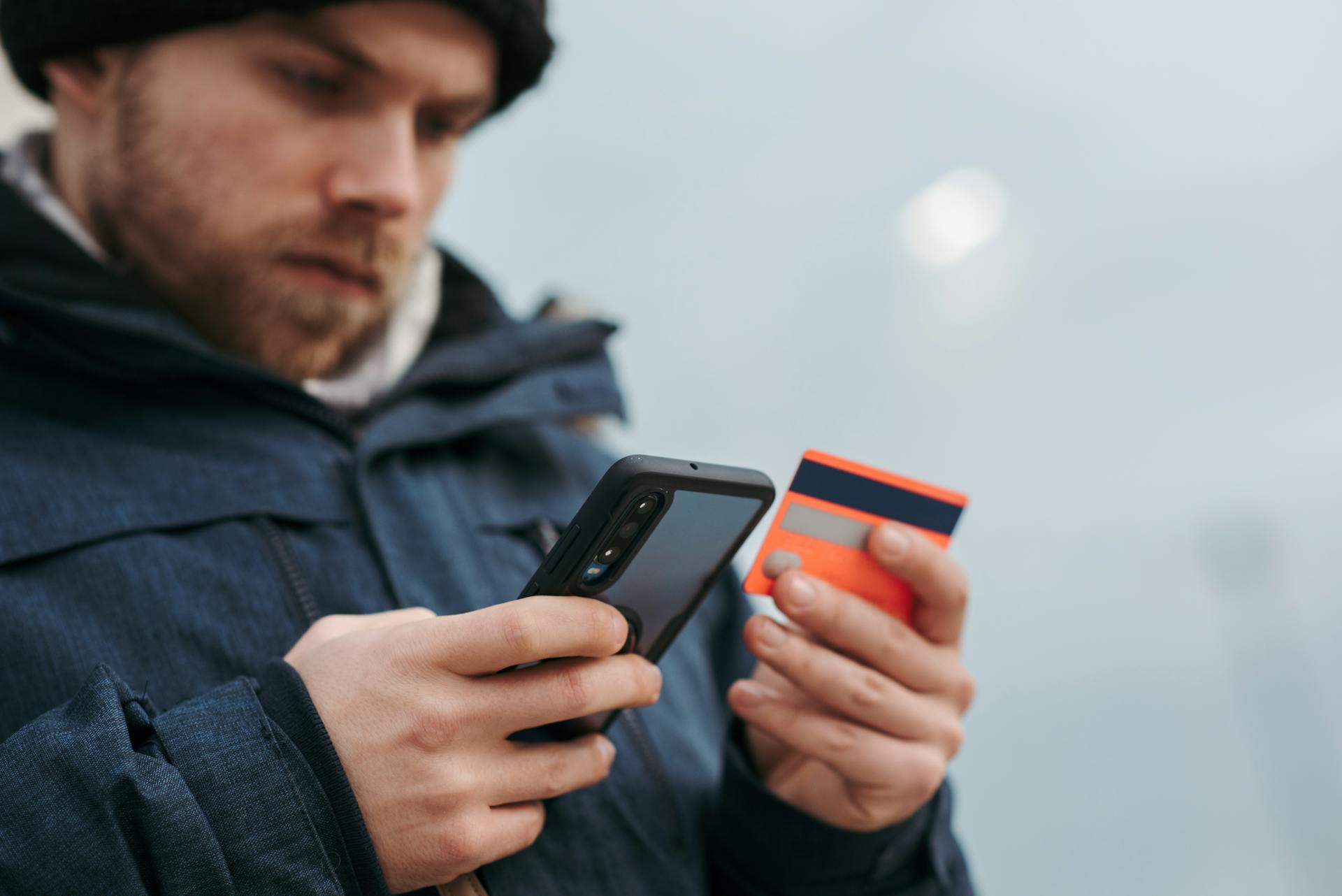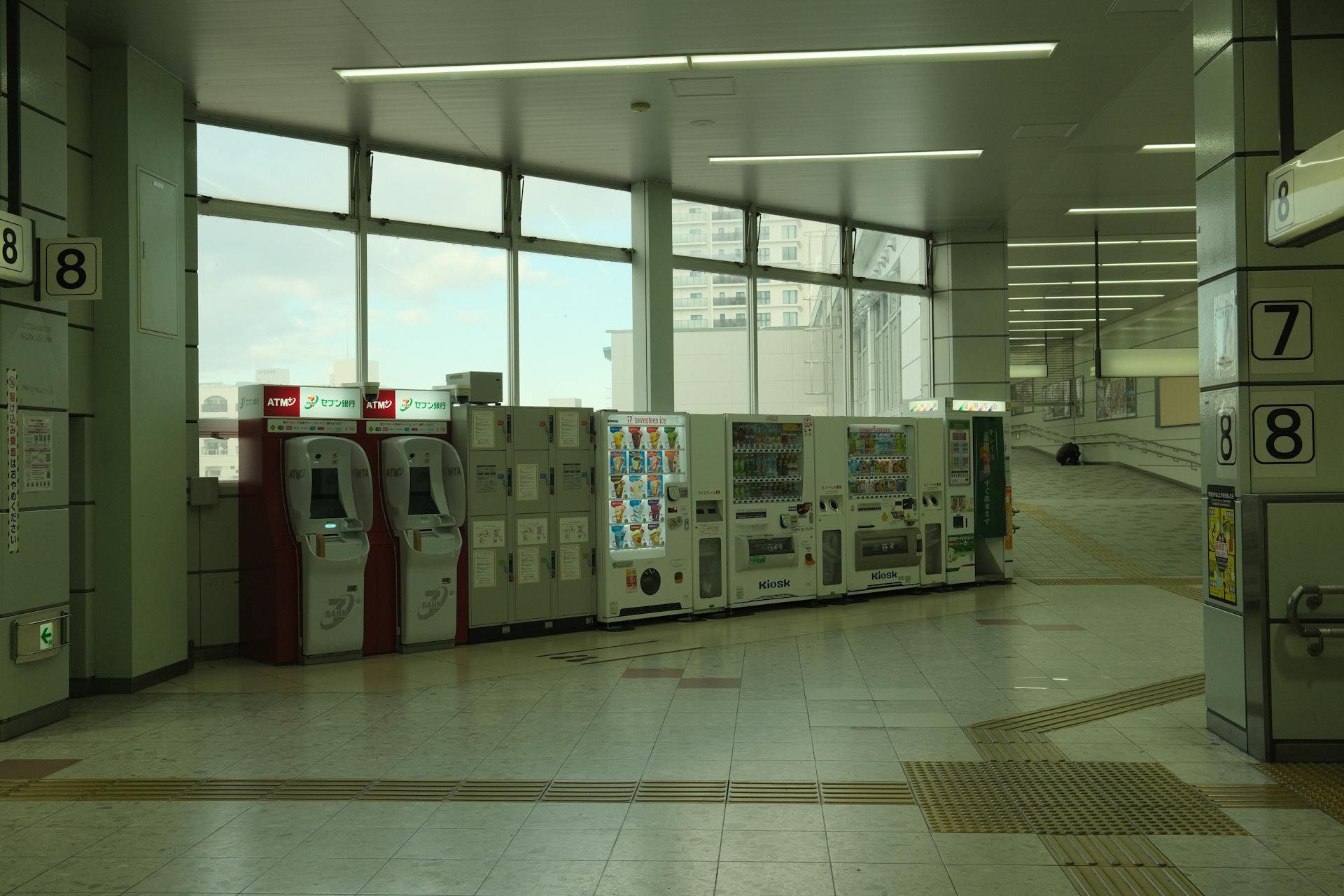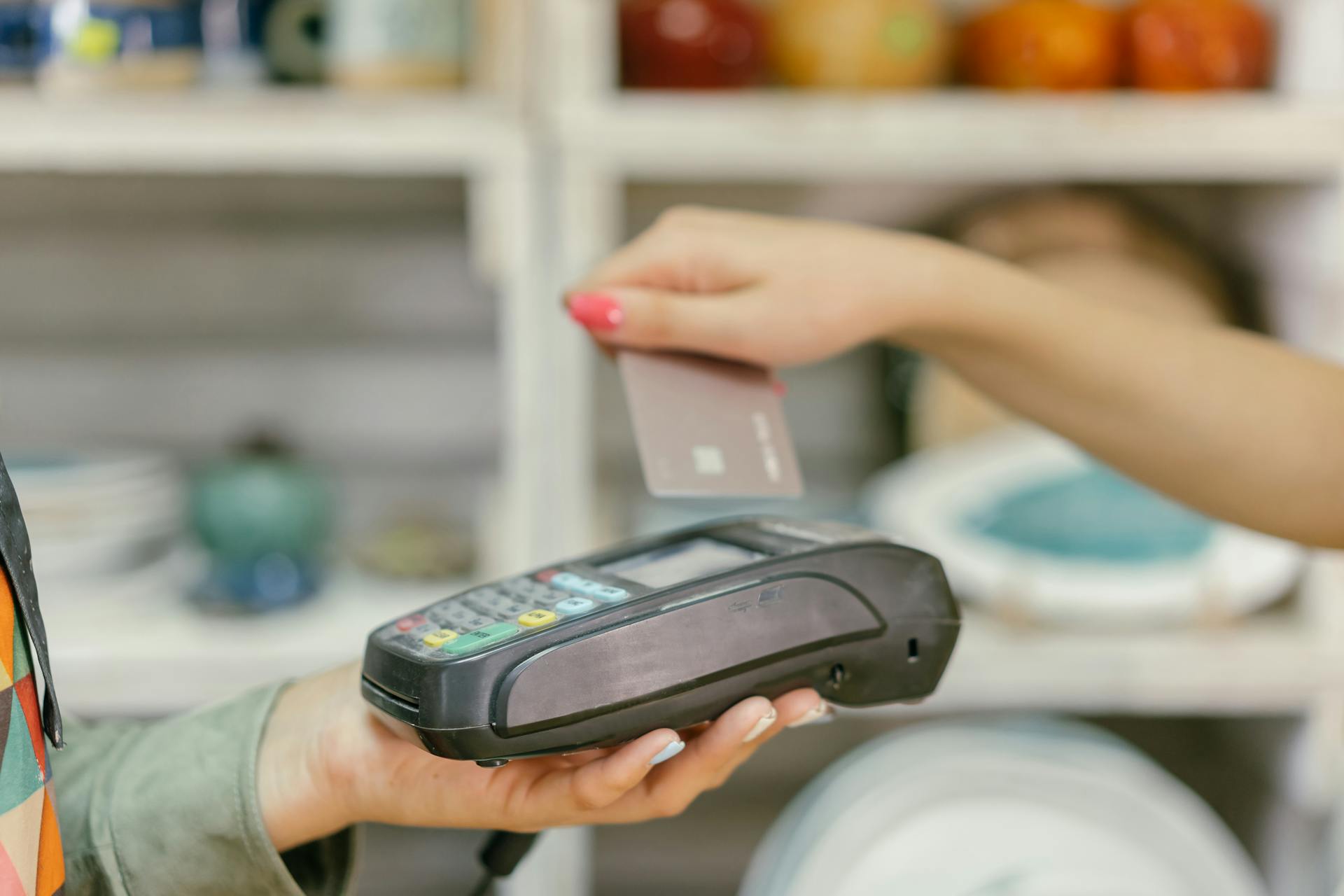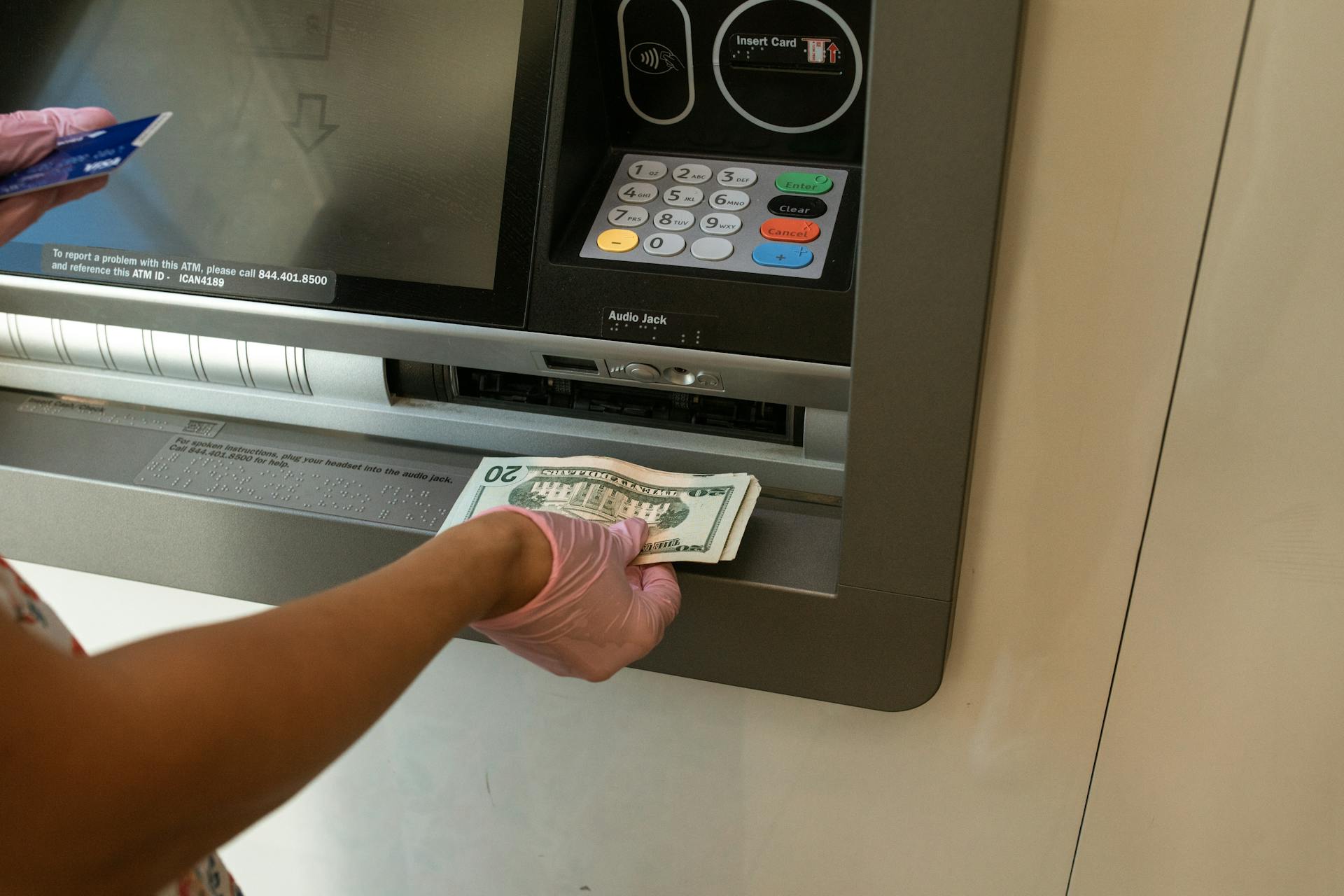
In Japan, cash is still king, but credit and debit cards are becoming increasingly accepted. You'll find that many businesses, especially smaller ones, prefer cash payments.
The use of cash is deeply ingrained in Japanese culture, with many shops and restaurants not accepting credit cards. In fact, some stores may not even have a credit card machine.
However, major retailers, restaurants, and convenience stores are starting to accept credit and debit cards, especially those affiliated with major chains like 7-Eleven and FamilyMart.
Cash
Japan is still a predominantly cash-based society, especially in rural areas and when visiting small, independent businesses. It's essential to have a good amount of cash on hand.
Having small denominations like 10 yen and 100 yen coins, as well as 1,000 yen notes, can be very useful. Many ticket and vending machines won't accept larger denominations, especially 5,000 and 10,000 yen bills.
You might feel uneasy carrying so much cash, but Japan has one of the lowest crime rates in the world. While it's always a good idea to be careful, the chances of losing money due to theft are relatively low compared to losing it by dropping or leaving it.
Some supermarkets and convenience stores have payment kiosks that let you use denominations down to 1 yen. This can be a great way to quickly deposit coins you're holding onto.
Exchanging Currency in Japan

Exchanging currency in Japan can be a bit tricky, but don't worry, I've got you covered. You can exchange foreign cash for yen at some banks, large hotels, department stores, and discount ticket shops.
The best rates can be found at discount ticket shops, followed by banks and post offices, while hotels and department stores offer the worst rates. US dollars are the preferred currency, followed by euros, while Aussie dollars, Kiwi dollars, Canadian dollars, and British pounds are not as welcome.
If you're nervous about using ATMs, it's a good idea to bring some foreign currency with you. Most major hotels and department stores will exchange major international currencies for Japanese yen, but the rates aren't great.
For a general idea of current exchange rates, check out XE Currency Converter or Wise's own Currency Converter. You can also exchange currency at airports, which is a convenient option.
Here are some convenient spots to withdraw and exchange yen:
- Convenience stores
- Japan Post Office
- Don Quijote
- Major cities, near train stations, and at airports
Some banks, like Mizuho Bank, Bank of Tokyo-Mitsubishi UFJ, and SMBC Trust Bank, offer a currency exchange service, but it's best to check if the branch has this service before heading there.
Convenience and Accessibility

Japan is a cash society, and you'll want to be prepared to use cash frequently. Most expenses must be paid in cash, so it's essential to bring some money with you when you first enter the country.
There are several ways to get cash in Japan, but using an ATM at a convenience store like Seven-Eleven, Family Mart, or Lawson is the easiest way. These ATMs are usually not far from where you are and can be used 24-hours a day.
You can use credit or debit cards, such as VISA, MasterCard, or American Express, to withdraw Japanese yen from these ATMs. Just be aware that the withdrawal limit is dependent on your bank, and certain rules and limits may apply.
If you need cash outside of regular business hours, post office ATMs are a good option. They accept foreign VISA, Plus, MasterCard, Euro Card, Maestro, Cirrus, American Express, Diners Card, and JCB cards, and provide an English user interface.
Here are some accepted currencies and cards at post office ATMs:
- USD, EURO, HKD, TWD, CNY, THB
- VISA, VISAELECTRON, PLUS, MasterCard, Maestro, Cirrus, American Express, JCB, Unionpay, DISCOVER
Keep in mind that post office ATMs are not accessible 24 hours a day, so plan accordingly.
Banks and Financial Institutions

Banks in Japan are a convenient option for exchanging currency, with most banks open from 9am to 3pm on weekdays. You'll get the best rate for US dollars, and most banks require you to show your passport when exchanging money.
Some major Japanese banks offer a currency exchange service, including Mizuho Bank, Bank of Tokyo-Mitsubishi UFJ, and SMBC Trust Bank. You can check their official websites for more information.
If you're looking for a bank with a currency exchange service near you, check if the branch has the service or not, as some don't offer it. Branches in major sightseeing places usually offer this service.
Here's a list of some major Japanese banks with currency exchange services:
- Mizuho Bank
- Bank of Tokyo-Mitsubishi UFJ
- SMBC Trust Bank
Japan Post Bank
Japan Post Bank ATMs can be found in hundreds of locations throughout Japan, often in post offices and convenience stores. These machines are convenient for withdrawing cash from international bank accounts.
The color of Japan Post Bank ATMs is usually green. Please note that the current withdrawal limit is 50,000 yen per transaction, and this amount is dependent on your bank.

You can withdraw cash from Japan Post Bank ATMs from Monday to Saturday from 00:05 to 23:55. On Sundays and public holidays, as well as December 31, the hours are 00:05 to 21:00. If the following day is a holiday, hours start from 7:00.
Japan Post Bank ATMs are closed on January 1-3, but you can still withdraw cash during these days from 7:00 to 21:00.
Kyoto Banks
Kyoto Banks are convenient for exchanging major currencies for yen, and you can do so during their normal operating hours, which are typically 9am to 3pm or 5pm on weekdays only.
You'll get the best rate for US dollars, making it a good idea to bring some with you to exchange. Most banks will require that you show your passport when exchanging money.
You can also exchange foreign cash for yen at some banks, but be aware that you'll get a lower rate compared to exchanging US dollars.
If you're planning to exchange a lot of cash, consider doing it at the airport, as it's the most convenient option and you'll have access to large banks and post offices with money exchange counters.
Bank Currency Exchange

Banks in Japan will exchange major currencies for yen during their normal operating hours, which are usually 9am to 3pm or 5pm on weekdays only. You'll get the best rate for US dollars, and you'll need to show your passport when exchanging money.
Some banks, like Mizuho Bank, Bank of Tokyo-Mitsubishi UFJ, and SMBC Trust Bank, offer a currency exchange service. However, not all branches offer this service, so it's best to check ahead of time.
You can find the official websites of these banks in English: Bank of Tokyo-Mitsubishi Tokyo UFJ, SMBC Trust Bank, and Mizuho Bank.
Banks are usually open from 9am to 3pm on weekdays, and some branches near major sightseeing places may offer extended hours.
Here's a list of banks that offer currency exchange services:
- Mizuho Bank
- Bank of Tokyo-Mitsubishi UFJ
- SMBC Trust Bank
Keep in mind that the availability and rates of currency exchange services may vary depending on the bank and location.
Alternatives to Traditional Methods
You can use a Wise card to have more spending flexibility in Japan, always knowing you'll get competitive exchange rates.
The Wise card also allows you to set currency alerts or auto-convert currency, which can be a huge help when traveling.
With Wise, you can transfer funds to a local account or have convenient access to currency during your trip.
Wise
Wise is a great alternative to traditional methods for transferring funds and accessing currency while traveling. It allows you to transfer funds to a local account economically, quickly and easily.
With Wise, you can have convenient access to currency during your trip. You can also use a Wise card to give you more spending flexibility in Japan.
A Wise card can help you get competitive exchange rates and the ability to set currency alerts or auto-convert currency. This can be especially useful when traveling to countries with fluctuating exchange rates.
Traveler's Checks
Traveler's Checks can be a useful alternative to traditional methods of exchange in Japan. They offer more favorable rates than money changers and ATMs, and are widely accepted by major banks, hotels, and stores in major cities.
However, it's worth noting that traveler's checks are not as widely accepted outside of major cities, so it's essential to plan accordingly.
You should avoid drawing traveler's checks from a foreign bank, as many Japanese places will charge large extra fees or not accept them at all.
Here are some key points to consider when using traveler's checks:
- Traveler's checks tend to carry more favorable rates than money changers and ATMs.
- They are widely accepted by leading banks, hotels, ryokan, and stores in major cities.
- Do not pay with a check drawn from a foreign bank.
Featured Images: pexels.com


